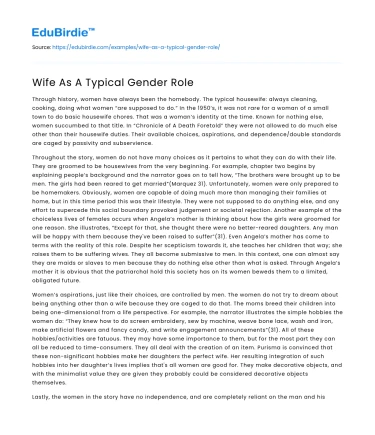Through history, women have always been the homebody. The typical housewife: always cleaning, cooking, doing what women “are supposed to do.” In the 1950’s, it was not rare for a woman of a small town to do basic housewife chores. That was a woman’s identity at the time. Known for nothing else, women succumbed to that title. In “Chronicle of A Death Foretold” they were not allowed to do much else other than their housewife duties. Their available choices, aspirations, and dependence/double standards are caged by passivity and subservience.
Throughout the story, women do not have many choices as it pertains to what they can do with their life. They are groomed to be housewives from the very beginning. For example, chapter two begins by explaining people’s background and the narrator goes on to tell how, “The brothers were brought up to be men. The girls had been reared to get married”(Marquez 31). Unfortunately, women were only prepared to be homemakers. Obviously, women are capable of doing much more than managing their families at home, but in this time period this was their lifestyle. They were not supposed to do anything else, and any effort to supercede this social boundary provoked judgement or societal rejection. Another example of the choiceless lives of females occurs when Angela’s mother is thinking about how the girls were groomed for one reason. She illustrates, “Except for that, she thought there were no better-reared daughters. Any man will be happy with them because they've been raised to suffer”(31). Even Angela’s mother has come to terms with the reality of this role. Despite her scepticism towards it, she teaches her children that way; she raises them to be suffering wives. They all become submissive to men. In this context, one can almost say they are maids or slaves to men because they do nothing else other than what is asked. Through Angela’s mother it is obvious that the patriarchal hold this society has on its women beweds them to a limited, obligated future.
Save your time!
We can take care of your essay
- Proper editing and formatting
- Free revision, title page, and bibliography
- Flexible prices and money-back guarantee
Women’s aspirations, just like their choices, are controlled by men. The women do not try to dream about being anything other than a wife because they are caged to do that. The moms breed their children into being one-dimensional from a life perspective. For example, the narrator illustrates the simple hobbies the women do: “They knew how to do screen embroidery, sew by machine, weave bone lace, wash and iron, make artificial flowers and fancy candy, and write engagement announcements”(31). All of these hobbies/activities are fatuous. They may have some importance to them, but for the most part they can all be reduced to time-consumers. They all deal with the creation of an item. Purisma is convinced that these non-significant hobbies make her daughters the perfect wife. Her resulting integration of such hobbies into her daughter’s lives implies that's all women are good for. They make decorative objects, and with the minimalist value they are given they probably could be considered decorative objects themselves.
Lastly, the women in the story have no independence, and are completely reliant on the man and his money. If a woman did not get married she would live with her parents. Not only that, the community was based on double standards. As girls become women, they are instilled with the understanding that “love can be learned”(35). Growing boys, however, are taught to choose whoever they want. If Angela does not follow these rules she will be an outcast from society and will never have the hopes of moving up in class. When she doesn’t follow the image of a “perfect women,” Santiago is killed in her honor. The result of these double standard leads directly to the death of Santiago. This untimely death only solidifies the true objectification of women in this society.
In conclusion, there is not much to Angela’s life--or the lives of the rest of the women in the story. They have no life choices, their aspirations and independence are caged, and their community lives a double standard lifestyle. They are to simply do their duties as a housewife. Their life outside of this role is to be nonexistent--as considered by standards--and any outward expansion is frowned upon. They are forced into marriage hoping good will come out of it. In the 1950’s this was a typical role for a woman. The apple doesn’t fall far from the tree.






 Stuck on your essay?
Stuck on your essay?

